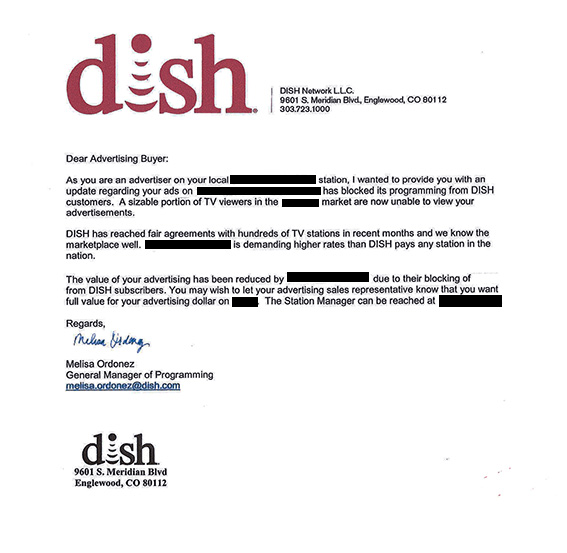Regulatory profiteer DISH Network is faithfully executing its apparent campaign to use carriage impasses to induce the Federal Communications Commission (FCC) to tip its retransmission consent rules in DISH’s favor. DISH has become the market leader in creating impasses, harnessing the resulting consumer frustration, and through its proxy the American Television Alliance, driving its customers to the Commission to demand a regulatory “fix.”
While clever, DISH’s plan has one glaring blind spot: DISH itself.
Those who have seen DISH in action over the years know that the company cannot be trusted. DISH will bend – and sometimes break – the rules to achieve its bottom line ends. The company has absolutely no problem jumping up and down about the behavior of others while it engages in tactics that go far beyond what it is complaining about. This no-shame playbook has become a DISH trademark.
DISH’s dispute with Tribune is yet another excellent example of DISH’s tactics. Earlier this week, DISH filed a lawsuit against Tribune, alleging, among other things, that Tribune is interfering with “contractual relations” and DISH’s “prospective economic advantage.” Its primary complaint is that Tribune has run ads and operates websites that explain to viewers why they aren’t receiving Tribune programming on DISH and how it can access those stations if the impasse continues (use an over-the-air antenna or switch providers). DISH grouses that Tribune shouldn’t be encouraging consumers to switch providers and that Tribune cannot inform the public that a Consumer Reports survey found that DISH customers gave the company the worst rating for value (even though, as DISH acknowledges in its complaint, the allegation is completely true).
The problem for DISH – in addition to the fact that Tribune’s actions are lawful – is that it doesn’t want the FCC to look behind the curtain. If it did, then the FCC would learn that not only is DISH informing viewers much like Tribune, but it also is going even further. DISH is of course running a rotating loop of videos on the channels typically occupied by Tribune stations complaining that the retrans impasse is exclusively the fault of greedy broadcasters. It also pushes viewers to its propaganda website DISHPromise.com (unrelated to DISHfingerscrossedbehindourbacks.com).
But beyond the traditional exchange, DISH’s playbook includes a darker, more dastardly set of tactics. Even as DISH complains that broadcasters are damaging its “prospective economic advantage” by suggesting consumers switch providers, DISH routinely sets out to damage the relationship between local stations and their advertisers (which also could be DISH advertisers). DISH has sent, and continues to send, letters to advertisers of stations experiencing an impasse with DISH (see letter below) telling them that the value of their advertising has been reduced because of the impasse and encouraging those advertisers to contact that station and demand “the full value of [their] advertising dollars.” It even provides the direct contact number of the station’s manager.
The intended effect of this campaign is clear – punish stations for not acceding to DISH’s demands. As NAB has noted repeatedly, impasses already hurt local stations far more than they do pay-TV providers, especially major national pay-TV providers like DISH. When a station experiences an impasse with a pay-TV distributor, it can immediately lose up to 20-30 percent of its viewing audience (sometimes even more). Those lost eyeballs are lost dollars, and the toll adds up with each passing day, putting enormous pressure on stations to reach a deal. These DISH letters are designed to amplify that pain and force stations into submission.
With these facts apparent, DISH can be seen for what it really is: villain and not victim. Its lawsuit against Tribune is nothing more than a publicity stunt – and a weak one at that. Indeed, the only thing that’s still confusing about this whole sordid affair is how DISH thinks it can continue to get away with it. With its well-known history as a regulatory schemer, you might think DISH would lay low and not take on such a public role as the poster child for pay TV’s attempt to change the retrans rules. But that’s not the DISH way. The DISH way is to push forward at any cost and hope that no one notices its hypocrisy. Well DISH, we’ve noticed and it won’t be long before the FCC does too.

 (Click to enlarge.)
(Click to enlarge.)